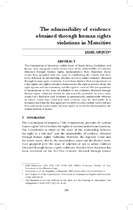| dc.contributor.author | Mujuzi, Jamil Ddamulira | |
| dc.date.accessioned | 2019-01-16T07:26:57Z | |
| dc.date.available | 2019-01-16T07:26:57Z | |
| dc.date.issued | 2018 | |
| dc.identifier.citation | Mujuzi, J. (2018) The admissibility of evidence obtained through human rights violations in Mauritius. SACJ, 31 (2): 260-281 | en_US |
| dc.identifier.issn | 1011-8527 | |
| dc.identifier.uri | http://hdl.handle.net/10566/4232 | |
| dc.description.abstract | The Constitution of Mauritius, unlike those of South Africa, Zimbabwe and
Kenya, does not guide courts on the issue of the admissibility of evidence
obtained through human rights. Jurisprudence from Mauritius shows
courts have grappled with the issue of establishing the criteria that have
to be followed in determining whether or not to admit evidence obtained
through human rights violations. Courts have limited their jurisprudence to
a few rights: the right to freedom from torture; the right to remain silent; the
right against self-incrimination; and the right to counsel. The jurisprudence
is inconsistent on the issue of whether or not evidence obtained through
human rights violations should be automatically excluded. In some cases
courts have held that such evidence is automatically inadmissible whereas
in others courts have held that such evidence may be admissible. It is
recommended that the best approach would be to only exclude such evidence
if its admission would render the trial unfair or would be detrimental to the
administration of justice. | en_US |
| dc.language.iso | en | en_US |
| dc.publisher | Juta Law Publishing | en_US |
| dc.subject | Mauritius | en_US |
| dc.subject | Constitution | en_US |
| dc.subject | Legislation | en_US |
| dc.subject | Human rights violations | en_US |
| dc.subject | Fair trial | en_US |
| dc.title | The admissibility of evidence obtained through human rights violations in Mauritius | en_US |
| dc.type | Article | en_US |

